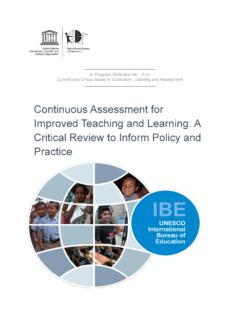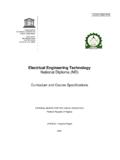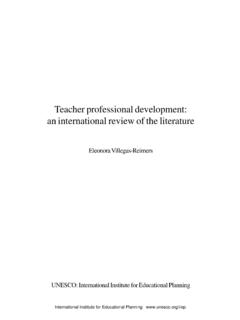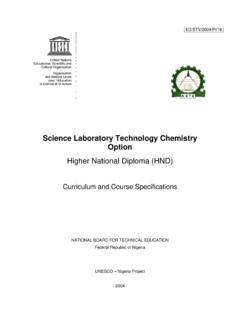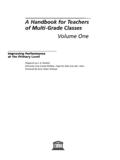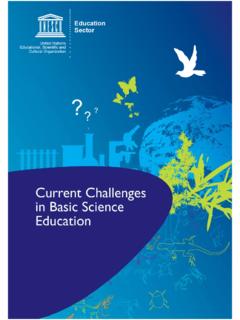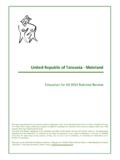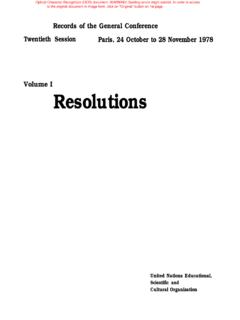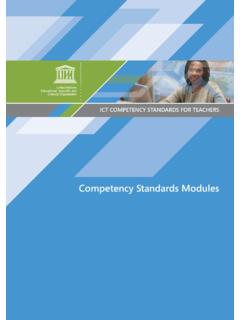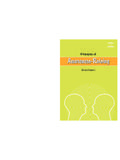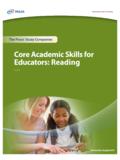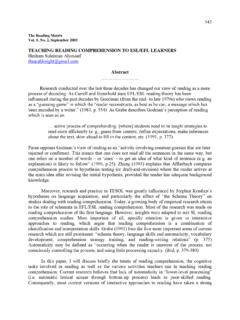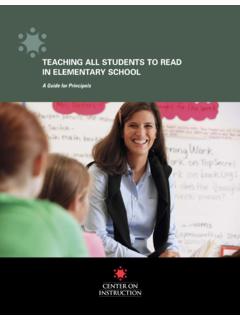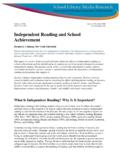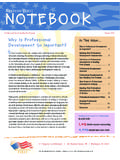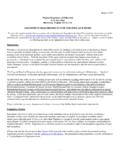Transcription of Teaching reading in primary schools; 2004 - UNESCO
1 MODULE Teaching reading in primary Schools UNESCO \ Acknowledgements This training module resulted from a joint initiative of the primary Education Section and the Cross-cutting Project on Information and Communication Technology (ICT) Used Training in Basic Education for Social Development. We wish to thank the ICT project team for its contribution and co-operation. Special thanks are due to Dr. Elaine Carter, UNESCO consultant, who prepared the draft of the module and who has been a trainer in the series of training workshops for teacher trainers on reading in Uganda. We are indebted to the International reading Association (IRA), in particular to Dr. Charles Temple and his team for the Active Learning Project in Tanzania, and Bowser who has been a catalyst in the process.
2 This module drew on their guidebook and benefited from the wide experience of the IRA. Mention must be made of Ms. Mirla Olores, the Department of Education of the Philippines, Dr. Tinsiri Siribodhi, St. John s Group of Institutions in Thailand and UNESCO Office Dar es Salaam for their invaluable inputs to the review of the module, thus giving it a more global perspective. Thanks are also due to the following institutions for their co-operation during the recording of video scenes: Uganda Ministry of Education and Sports, National Commission for UNESCO in Uganda, Media Plus LTD. We are also grateful to the audio-visual team of UNESCO for their contribution to the project. Finally, we owe a depth of gratitude to the educators in Africa who shared their ideas and experiences in teacher-training, so that the module and the accompanying CD-ROM would be relevant to their training needs.
3 Winsome Gordon Chief primary Education Section Basic Education Division Akiko Takahashi Project co-coordinator UNESCO 2 MODULE Teaching reading in primary Schools INTRODUCTION primary education is the basic education which aims at preparing children to attain the competence needed to advance further in making a worthwhile contribution to society, which is constantly undergoing changes. In order to fulfil this objective, teachers must keep abreast with current thinking, and engage in training that will enhance the Teaching - learning process. Central to the success of the Teaching - learning process is the level of attainment by children in the area of reading . Unfortunately, this has created cause for concern in many societies, as the high rate of illiteracy continues to adversely affect the progress of a technological advancing world.
4 Since reading forms the basis for all other areas of learning, it is necessary to ensure that children of the primary grades attain proficiency in reading . This implies that teachers in the primary grades will have to vary traditional methods of Teaching , and improve their knowledge base by engaging in training, including information communication technology (ICT) training. The objective of this module, is to provide teacher trainers with the knowledge, and strategies that will enable them to gain insight into the changing concept of the reading process, and how to utilize the knowledge, and apply the strategies to facilitate the Teaching - learning process. Additionally, the module emphasizes the engagement of the children at the different stages, thereby making the task of Teaching child-centred, rather than children being passive recipients.
5 The module is offered as a resource for trainers, and each unit provides information concerning the interactive process of facilitating reading in the primary school with emphasis at the early grades, and with a view to modifying texts and strategies as children progress. The various aspects of 3 reading that are included in the module were intended to encourage reading across the curriculum at all levels. The first unit provides an overview of the changing concept of the reading process, from a set of skills to be learnt in a certain order, to an interactive process involving the reader, the text, and the context. The interactive process of reading has encouraged a change in the Teaching of reading from the traditional approaches to emphasis on approaches which reflect cognitive principles.
6 Critical to these principles are the areas of language development, children interest, self concept, emotional and physical factors. Unit two emphasizes that fostering early literacy development in the home helps the progress of children at school . Guidance is provided in enhancing early literacy development, and beginning reading acquisition. Unit three provides approaches to the Teaching of reading based on the interactive process, and reflecting cognitive principles. The approaches emphasize methodologies which can foster literacy development through the grades, and the importance of providing effective reading instruction for beginners. Unit four offers strategies for comprehending texts. Many children continue to experience problems in comprehending texts, and this affects their performances in the various subject areas.
7 This unit provides a variety of strategies to enable the readers to obtain the appropriate message intended by the authors of texts, if the strategies are applied appropriately. Writing and reading are inter-related, and Unit five offers strategies to use writing to promote thinking, and learning across the curriculum. Additionally, children should be given the opportunity to share their writing, and to use writing to communicate with others. In Unit six, guidance is provided in the process of gathering data, in order to better understand the strengths and weaknesses of children. The suggestions made for assessment will enable teachers to become more adept in carrying out the process in relation to the method of instruction, and using information gathered to modify instruction where necessary.
8 Unit seven gives examples of material and activities that will be useful in enhancing the process of Teaching reading . The Teaching aids can be made 4 from discarded or inexpensive materials, and can be done at home by parents and children, or at school by teachers and students. Unit eight emphasizes that social and physical factors are important for creating an appropriate environment for success in literacy acquisition and development. In putting together this module, the writer wanted to share with educators the enthusiasm to be experienced as each unit is followed, and new and creative ideas are revealed from the reading , as well as from the educators own thinking. It is anticipated that this will evoke creative ideas among children, thereby making the Teaching - learning process enjoyable and fulfilling.
9 V. Elaine Carter, 5 TRAINING MODULE Teaching reading in primary Schools CONTENTS Page Introduction 3 Unit 1. The Changing Concept of the reading Process 10 10 Topic 1 - The Changing Concept of reading Topic 2 - Cognitive Principles for Enhancing Literacy Development 12 - Guide to Applying Cognitive Aspects of reading 13 - reading Informational Text 17 - How to Ascertain Student s Interest 19 Unit 2. Fostering Literacy Development Topic 1 - Early Literacy Development Topic 2 - Home- school Partnership and Parental Involvement Topic 3 - Assessing Young Readers Literacy Knowledge - Guidelines for Recording Running Records Topic 4 - A Guide to Beginning reading Acquisition Topic 5 - Word Identification Topic 6 - Sight Words Topic 7 - Developing Vocabulary - Semantic Mapping 20 21 22 24 25 27 27 32 33 35 6 CONTENTS Page 36 37 Topic 2 - Shared reading 38 39 Topic 4 - Language Experience Approach 41 Topic 5 - Independent reading 46 47 Topic 7 - Supporting the Use of the Mother Tongue 48 Topic 8 - Using Multiple Intelligences for Literacy Learning 49 Unit 3.
10 Approaches to Beginning reading Acquisition Topic 1 - Read Alouds Topic 3 - Guided reading Topic 6 - Directed Listening-Thinking Activity(DLTA) - Multiple Intelligences Inventory Unit 4. Facilitating reading Comprehension Topic 1 - A Guide to Comprehending Text Topic 2. - Strategies to Foster the Comprehension of Text - Semantic Webbing - Text Structure - Story Circle to Aid Sequencing - Directed reading -Thinking Activity(DRTA) - Questioning - Discussion Web - Information Processing - Summarizing and sequencing - Reciprocal Teaching - Note -taking Unit 5. Strategies for Teaching Writing Topic 1 - Strategies for Teaching Writing - Journal Writing - Story Circle - Story Map - Acrostics - Cinquains - Diamante - Expository Writing - The Writing Workshop - The I-Search Paper - Co-operative Teaching Strategies - ValueLine 51 53 54 55 57 57 57 60 62 63 64 64 65 65 66 67 67 67 67 69 69 70 70 70 73 75 75 7 CONTENTS Page 76 77 - Observations 78 - Assessing Listening Comprehension in Grade 1 82 - Sampling Student Work through Portfolios 82 - Questions and Interviewing 82 Unit 6.
